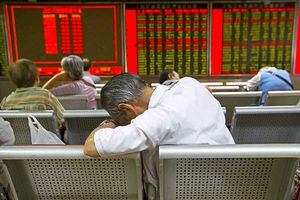Why China crisis has knock-on effect on Shropshire
When one of the world's leading economies catches a cold, the rest of the world shares its shivers. It even extends to Shropshire. Business Editor Thom Kennedy reports.

This week, it was China's turn to share its ailments with international markets.
But it doesn't mean the world is heading back into recession. But it also doesn't mean that we shouldn't all be concerned.
The benchmark share index in China, the Shanghai Composite, dropped by 8.5 per cent in one day on Monday, following weeks of stock market falls and the devaluation of the yuan currency to try to stem the drift of the world's second-largest economy.
Shares in the West followed suit, with the FTSE suffering its biggest one-day fall in more than six years on Monday, before recovering despite fresh falls in Shanghai yesterday.
"China is still a massive market," said Richard Sheehan, chief executive of Shropshire Chamber of Commerce, who said the situation in China should not be seen as similar to the American mortgage market as a precursor to a major global crisis.

The point at which interest rates in the UK begin to rise could be delayed by the crisis in China.
That is good news if you have a mortgage, but more misery if you have savings.
Savers have been clamouring for a rise in the base rate of interest, currently set at a record low of 0.5 per cent, because it means they are receiving almost no interest on the money they have in the bank.
Meanwhile, with rumours afoot that rates could rise, homeowners have been scrambling to fix their rate before they are faced with a rise in the monthly cost of their mortgage.
In response to the sharp slowdown in China, the Eastern superpower has cut its own base rate of interest to 0.5 per cent in a bid to stem the contraction in the economy.
Now questions are likely to mount over whether the slowdown will postpone Britain's own rates rise – particularly given the fall in the FTSE100 index in the last week.
Crossbench peer Lord Turner of Ecchinswell predicted the Chinese slowdown would "push back" the point where the Bank of England puts up interest rates. It means mortgage rates in the UK will remain low for a little bit longer.
He said: "I think what will happen as the inevitable consequence of the China slowdown, and the most important bit here is the very big slowdown of the economy rather than the fall in the equity prices, I think in response to that we will see that the point at which interest rates rise will be put even further back."
Asked how far into the future was the prospect of a rate rise in Britain, he said: "I don't know. I'm always very wary of predicting the precise point at which interest rates rise.
"But what I will say is I think we are in deeply deflationary times, I think what has happened in China was in a sense predictable and indeed predicted."
"There are still significant opportunities there, but this slowdown has had both a physical impact on businesses that are currently exporting, and also on confidence, which has been slowly but surely improving.
"We need to put things in perspective. This is not something which has been completely unexpected, as the Chinese market has been a little volatile for some time now, and there are still huge opportunities in China.
"Of course it's a massive country, and if the population of China sneezes, we feel it around the world because it's such a big player in world markets."
Some FTSE members with major operations in Shropshire saw their share prices plummet on the so-called Black Monday, as the FTSE quivered in the wake of the Chinese slowdown.
BAE Systems' price hit a 52-week low of 419.3p in the midst of the across-the-board price slump, before recovering to 437.4p on Tuesday, and continuing its upward trend as part of a wider improvement yesterday.
GKN was another company whose shares were at a 12-month low, dropping as far as 272.3p, having fetched 388p in February.
Smaller companies in Shropshire have more indirect exposure to the Chinese market, including a number in the automotive supply chain, and Mr Sheehan said considerable opportunities remain despite the slowdown in China.
"We have seen a huge expansion in China's consumption of British goods," he added. "Shropshire has a provision of supply chain to the automotive industry, for example.
"The growth in China's middle class means designer labels are very popular. We are seeing consumption of various food products that are newly introduced to Chinese tables – all huge opportunities in a massive market.
"This all seems to be almost a natural correction in many areas. There has been an awareness of this for some time, albeit it seems to have happened very quickly. This is a rebalancing, a slight adjustment of China's economic profile."
The FTSE 100 Index bounced back above the 6,000 mark yesterday, after surging by nearly two per cent in morning trading, as it recovered following one of its worst sessions in recent years.
The rise of 115 points added about £29 billion back on to the value of the UK's top 100 listed companies after about £74 billion was wiped off the FTSE 100 in the previous session. But the blue chip share index was still trading at lows not previously seen since the start of 2013 after Monday saw the top flight fall by 4.7 per cent. The slowdown could also have a significant impact on household finances.
There had been talk that the UK was on the cusp of seeing interest rates rise from their historic low level of 0.5 per cent, potentially adding to the cost of mortgages but boosting the value of people's savings. But that could be delayed thanks to the latest instability in the global economy.
So what should you do if you have invested in companies affected by the slowdown? According to Shrewsbury-based wealth planner Nick Jones, the most important thing is not to panic.
"Investor fears have been exacerbated by typically thin trading during the holiday season – trading volumes in FTSE 100 stocks since 1999 are on average 50 per cent lower in August than for the rest of the year," he said.
"Since China is such a large importer of raw materials – it consumes some 43 per cent of the world's metal production – and is a growing consumer of foreign manufactured goods, slower growth will ripple through the world economy."
He added: "After the strong market rally of recent years, we have seen a return to the volatility that is an inherent feature of equity markets. However, it is important to remember that this is a function of marking down prices and not a stampede of investors heading for the exit door.
"Equity markets have been enjoying an extended bull run and have always provided good returns over the long term, but they are prone to bouts of volatility, and during such periods it is vital that investors keep their longer-term perspective. These events underline the importance of maintaining a well-diversified portfolio. Perhaps the best thing to do is nothing, but that will mainly depend on your own personal circumstances."





